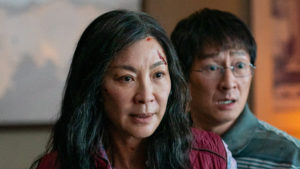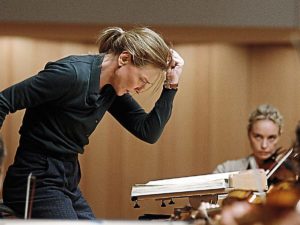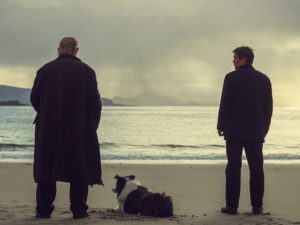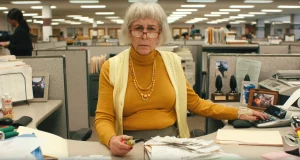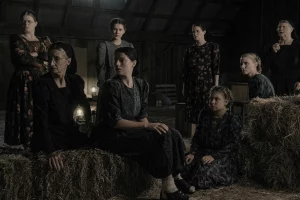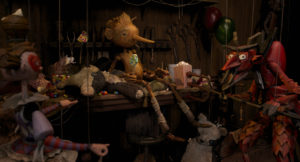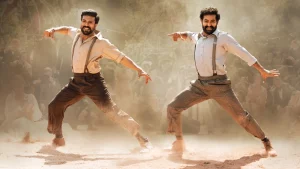The 2023 Oscar ceremonies bear down on us all like a vacant, runaway bus on an oil-slicked interstate. And yet, people still can’t stop nattering about what happened at the 2022 ceremonies, when somebody’s husband got so mad at somebody else’s bad joke at her expense that he bitch-slapped that somebody else while ABC did its gosh-darndest to keep us from seeing it happen. Now the Motion Picture Academy of Arts & Sciences have assembled a “crisis team” to make sure it doesn’t happen again. Too bad. They could use the ratings. And they know it.
For yet another year, the Academy Awards stagger into view beneath a fog of uncertainty as to whether they should continue to exist at all. In a recent interview, erstwhile Paramount Pictures honcho Barry Diller declared awards season “an antiquity”, along with the movie industry that kept them propped up for more than a century. The business model, Diller says, of a movie “going to a theater, building up some word of mouth if it was successful, having that word of mouth carry itself over” has been overpowered by streams, clouds, and movie theaters closing in America and abroad as a reverberating byproduct of the COVID-19 lockdown. The very definition of a “movie,” he adds, “is in such transition that it doesn’t mean anything anymore.”
He’s right, of course. And yet, here we are again, rewiring this tired old circuitry to get audiences in the mood for another night of triumph, tears, suspense, and whatever else Oscar hype used to promise. What’s kind of ironic, if not all that significant, is that this year, there may be real suspense in a few of the major categories given the mixed results along the way in the awards leading up to March 12. As of this writing, all the trade publications and prognosticators are certain Everything Everywhere All at Once will win everything, everywhere, etc. As you’ll note below, I’m not as convinced, at least not for Best Picture.
I’m also not convinced that this will be the last Academy Awards broadcast, nor, for that matter, the next one, or the one after that. Because, as wobbly as things are with the Oscars, and as more people, even movie lovers, wish they would go away already, no one seems to have any ideas as to what, if anything, would fill the void they would leave behind. As with newspapers, all-star games, and other institutions struggling for new identities in the still-new century, the very nature of what a “movie” is and what the criteria is for assessing its value, artistically or commercially is, unavoidably, under review in several quarters. Whatever the case, the movie business as we once knew it may be dying, but movies are not; any more than opera, live theater, even the damn novel, all of which persist, despite no longer occupying the center of the zeitgeist.
In fact, what is a zeitgeist these days anyhow? If the Oscars are little more than a lame excuse to avoid dealing with that question, then, they’re good for something after all.
As always, projected winners are listed in bold with FWIW (For Whatever Its Worth) notes added whenever I feel like it.
Best Picture
All Quiet on the Western Front
Avatar: The Way of Water
The Banshees of Inesherin
Elvis
Everything Everywhere All at Once
The Fabelmans
Tár
Top Gun: Maverick
Triangle of Sadness
Women Talking
Let’s get this party started by clambering out on a limb. As I’m writing this, the Screen Actors Guild, the Producers Guild of America, and the Directors Guild of America have all given their top honors to Everything Everywhere All at Once with BAFTA dissenting by making All Quiet on the Western Front its choice for Best Picture. That digression, though hardly major, should be a hint that this season’s predictions shouldn’t be, if not set in stone, certainly written in ink. As the New York Times’s Kyle Buchannan tweeted, not since Apollo 13 swept the PGA, DGA, and SAG’s top prizes 28 years ago has a movie winning those awards fell short of winning the Best Picture Oscar. On the one hand, that’s a formidable precedent; on the other, if it happened at least once before…
At the risk of repeating myself (at least to those of you who’ve been paying attention to my annual dithering on these things), the Oscars, even in their present emaciated state, are trade awards, first, foremost, and for however long they go on. In the medium’s customary tug-of-war between Art and Commerce, the latter tends to have the upper hand in the Academy’s consideration. Neither the media nor the moviegoing public are factors in the voting except for those parts of the latter group with craft union cards within the moviemaking industry. Thus, most of the Academy’s final decisions have less to do with the quality of a motion picture and more to do with assessing its overall impact on their industry’s future. Hence, I put it to you: which of these eight movies has done more to bolster whatever’s left of the movie business’s sagging confidence?
Before you answer, I need to remind you that at this year’s annual Oscars luncheon, TG:M’s co-producer and star Tom Cruise made the biggest splash among its record-breaking 182 attendees; he was the Big Man On Campus, its Belle of the Ball, with none of the baggage he’s had to lug over the past 20 years. In a year with as many wide-open categories as this, the top prize may be the widest and most open of the competitions, excepting the feature documentaries. Draw your own conclusions, but at this moment, I can easily see Captain Maverick and his squadron booming and zooming to the winner’s circle. And because the movie was better than anybody had the right to expect, it wouldn’t be the most embarrassing Best Picture award in Oscar history. Too many others compete for that dubious honor.
FWIW: I doubt Prey or Nope, two of my own favorite movies from last year, would have made this list; nor would the tightly wound and ferociously topical Emily the Criminal and the sumptuously Hitchcockian detective story from Korea Decision to Leave. What all these had in common, as far as I was concerned, was a sense of each movie going about its business, doing what needed to be done in their allotted time, and keeping their audiences alert for surprise and possibility within tight corners. In short, they were the kind of movies I sought out in theaters or drive-ins in an earlier, different life.
Best Director
Martin McDonagh, The Banshees of Inesherin
Daniel Kwan, Daniel Scheinert, Everything Everywhere All at Once
Steven Spielberg, The Fabelmans
Todd Field, Tár
Ruben Öslund, Triangle of Sadness
Fablemans is a Steven Spielberg movie about Steven Spielberg. Some people have a problem with this, and I don’t know why. It’s not getting skunked the same way that his remake of West Side Story did a couple years ago. But you’d think a love letter to movies and moviemaking would be a slam dunk with voters. Instead, Team Daniel has been riding in triumph throughout awards season and there’s not so much as a pebble to trip them up to the winner’s circle.
Best Actor
Austin Butler, Elvis
Colin Farrell, The Banshees of Inisherin
Brendan Fraser, The Whale
Paul Mescal, Aftersun
Bill Nighy, Living
At the start, this category appeared to belong to Farrell or Fraser, whose SAG win may have put him back in play. But maybe it’s kind of a retroactive referendum on what people admired more about Robert De Niro’s Oscar-winning portrayal of Jake La Motta in 1980’s Raging Bull. Was it the all-out depiction in La Motta’s volatile personality or was it the fact that De Niro invested so deeply into the role that he made himself gain weight? Guess we’ll see.
Best Actress
Cate Blanchett, Tár
Ana de Armas, Blonde
Andrea Riseborough, To Leslie
Michelle Williams, The Fabelmans
Michelle Yeoh, Everything Everywhere All at Once
Everybody I know, including me, is rooting for Yeoh, though Blanchett’s been mounting a doughty and, it would appear, successful campaign to dispel the negative vibes her movie stirred up in the classical music community. Cate’s BAFTA win teases us into thinking this will be a photo finish, but somehow, I doubt it’ll be that close
FWIW: Every year, the Oscars always seem to single out a “little” movie with a broken, put-upon protagonist struggling with some malady that s/he cannot control until they find redemption at the end. This year, that movie is To Leslie and its principal beneficiary is Andrea Riseborough, whose controversial nomination came through an eleventh-hour campaign with big names (Kate Winslet, Amy Adams, and Gwyneth Paltrow among them) pushing her over. This in turn led to cries of foul, especially among the #OscarSoWhite veterans believing Risborough’s candidacy came at the expense of such Oscar-worthy lead performances as those of Danielle Deadwyler (Till) and Viola Davis (The Woman King), both of whom were nominated for SAG Awards, but lost to Yeoh. Till’s director Chinonye Chukwu accused Hollywood of “unabashed misogyny towards Black women.” She’s not altogether wrong. But it doesn’t mean Riseborough’s nomination is a manifestation of this prejudice. It’s legit. You come away from To Leslie with Riseborough’s all-out investment in her serial-fuck-up character resonating in your head. Do I think she’s better than Blanchett or Yeoh? Apples and oranges. Do I think Deadwyler was better in her movie than Riseborough was in hers? I’d say it’s a draw. Do I think Davis was better in Woman King? You bet I do because, as I’ve stated before on this platform, Viola Davis is God! Then again, I also would have wanted Aubrey Plaza represented here for Emily the Criminal. But who cares what I want? Not Hollywood. That, as we were once fond of saying, is show biz and biz-ness of any kind rarely plays fair. So, I say kudos to the coalition behind Riseborough for making their push. Someday soon, Black and Brown people will make their own Riseborough uprising because of the precedent it set. To repeat: that’s show biz.
Best Supporting Actor
Brendan Gleeson, The Banshees of Inisherin
Brian Tyree Henry, Causeway
Judd Hirsch, The Fabelmans
Barry Keoghan, The Banshees of Inisherin
Ke Huy Quan, Everything Everywhere All at Once
By now, a foregone conclusion. And, as with last year’s winner in this category, it’s also a great story: the little boy émigré from Vietnam who played Short Round in 1984’s Indiana Jones and the Temple of Down hitting the jackpot forty years later. Fun fact: Jeff Cohen, who played Chunk to his Data in 1985’s The Goonies, is now his lawyer.
FWIW: Keoghan was a surprise BAFTA winner in this category, and it may be because his poignant presence shined through the outsized personalities of Banshees’ two stars. He’ll get some attention, but, in many ways, he’s already won. As for Paper Boi (Henry), his day’s coming. Count on it.
Best Supporting Actress
Angela Bassett, Black Panther: Wakanda Forever
Hong Chau, The Whale
Kerry Condon, The Banshees of Ineisherin
Jamie Lee Curtis, Everything Everywhere All at Once
Stephanie Hsu, Everything Everywhere All at Once
Curtis’s SAG award shouldn’t have come as a surprise. For starters, she’s totally unrecognizable in the movie, at least at first. And Oscar loves it when the glamorous go all out to distort themselves on camera, especially when, in Curtis’s case, they’re Hollywood royalty. I’m now feeling it’s hers to lose. Bassett’s infusion of power and vulnerability helps ground what could have been an unwieldy popcorn blockbuster and made her an early favorite. But the MCU can’t withstand the accumulated might of ancestral movie legacy. Not this time, anyway.
Best Adapted Screenplay
All Quiet on the Western Front
Glass Onion: A Knives Out Mystery
Living
Top Gun: Maverick
Women Talking
On the one hand, giving an Oscar to a Nobel Prize winner like Kazuo Ishiguro (Living) would show elevated thinking on Hollywood’s part. On the other, Sarah Polley has quietly, diligently proven herself to be one of the world’s best writer-directors and I can’t see her walking away empty-handed from another one of these ceremonies.
Best Original Screenplay
The Banshees of Inisherin
Everything, Everywhere All at Once
The Fabelmans
Tár
Triangle of Sadness
Anything with Martin McDonagh’s name on it is all but automatically placed in this category’s pole position. This one’s an odd chamber piece, an astringent, overextended Laurel and Hardy sketch in which you actually feel the bumps on the noggin and see all the bruises, physical and otherwise. However thin the gruel, I can easily see it winning, though there’s always a chance that the momentum of EEAAO (“…with a moo-moo here and a moo-moo there…”) could sweep this one up.
Best International Feature
All Quiet on the Western Front
Argentina 1985
Close
EO
The Quiet Girl
Given a Best Picture BAFTA and eight other nominations, Edward Berger’s graphic, devastating take on Erich Maria Remarque’s novel is the surest bet on the table.
Best Animated Feature
Guillermo del Toro’s Pinocchio
Marcel the Shell with Shoes On
Puss in Boots: The Last Wish
The Sea Beast
Turning Red
I feel relatively alone in asserting that this spikier, darker take on The Puppet Who Wanted to Be a Real Boy may have been a more imaginative and adventurous movie than any of the Best Picture nominees if only in the way it risked pissing people off who cling to their memories of the Disney version, which, for the record, I love, too. Most of the experts think it’s a lock, but I’m sensing a groundswell of support for M. Shell.
Best Cinematography
All Quiet on the Western Front
Bardo: False Chronicle of a Handful of Truths
Elvis
Empire of Light
Tár
Another close race, this one primarily between James Friend’s work on All Quiet on the Western Front and Mandy Walker’s on Elvis. If Walker wins, she will be the first woman to do so. But Friend’s movie also is nominated for visual effects and production design, which experts say gives him the edge. Screw it. I’m going to put my chips on progress.
Best Documentary Feature
All That Breathes
Fire of Love
All the Beauty and the Bloodshed
A House Made of Splinters
Navalny
By far, the widest-open race this year. If precedent alone was a factor, Sara Dosa’s DGA prizewinner, Fire of Love, with its dual themes of nature and everlasting love (married scientists who perish in a volcanic explosion), would have the edge. Then again, voters’ hearts would be just as vulnerable to House Made of Splinters which is set in a home for neglected children awaiting adoption. But the timeliest of these nominees is Daniel Roher’s tense profile of the Russian opposition leader who survived poisoning by Vladimir Putin’s goons, recovered in Germany, and returned home to a hero’s welcome – and imprisonment. The winner may, as in previous cases, depend on whether voters want to assault the turmoil of what’s been happening in Russia and the Ukraine, or run from it towards more hopeful, or at least more heartening stories. I’ll guess I’ll just what-the-hell my chips on Roher’s film.
Best Score
All Quiet on the Western Front
Babylon
The Banshees of Inisherin
Everything Everywhere All at Once
The Fabelmans
Once more, with feeling, to 91-year-old John Williams, though Carter Burwell still hasn’t won one of these yet. Here as elsewhere, I’m not convinced Banshees is strong enough to pull him over the hump.
Best Original Song
“Applause” from Tell It Like a Woman
“Hold My Hand” from Top Gun: Maverick
“Lift Me Up” from Black Panther: Wakanda Forever
“Naatu Naatu” from RRR
“This is a Life” from Everything Everywhere All at Once
With Rhianna (“Lift Me Up”), Lady Gaga (“Hold My Hand”), and one third of David Byrne (“This is a Life”) in play, how is it possible that the showstopper in this bunch belongs to a Tollywood epic that somehow stormed the global marketplace? Everybody seems to have already taken its win for granted, but everybody, including me, has been wrong many times before on this category.


